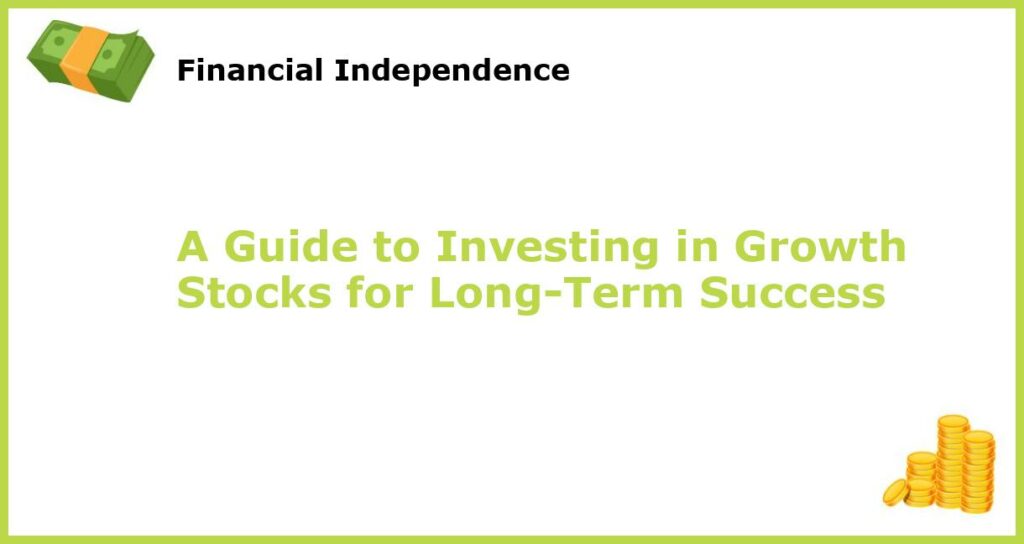When it comes to investing in the stock market, growth stocks can be an appealing option for investors looking for long-term success. These stocks are typically associated with companies that are growing rapidly, and they have the potential to generate significant returns over time. However, there are risks associated with investing in growth stocks, and it’s essential to understand these risks before diving in.
Identifying Growth Stocks
When it comes to identifying growth stocks, investors should look for companies that have the potential to grow significantly in the coming years. This can be based on a variety of factors, including the company’s business model, competitive edge, and sources of revenue. Additionally, investors should consider the industry trends and the health of the company’s financials to ensure that the company isn’t too risky to invest in. By carefully analyzing these factors, investors can identify the growth stocks that have the most potential for long-term success.
Understanding the Risks
While investing in growth stocks can be a profitable endeavor, it’s essential to understand the risks associated with these investments before jumping in. For one, growth stocks can be more volatile than other types of investments, meaning their prices may rise and fall more rapidly. Additionally, companies that are growing rapidly may be more vulnerable to competition, which can put future growth prospects in jeopardy. By understanding these risks upfront, investors can make more informed decisions about whether or not growth stocks are a good fit for their investment strategy.
Researching Companies
Before investing in a growth stock, it’s crucial to research the company thoroughly. This includes analyzing the company’s financial statements, researching its management team, and studying its industry competitors. Investors should also keep up-to-date with news and developments that could impact the company’s stock price. By conducting extensive research and staying informed, investors can make more informed decisions about whether or not to invest.
Investing for the Long-Term
Investing in growth stocks is typically a long-term strategy. Investors should have a time horizon of at least five to ten years, as these stocks may take time to reach their full potential. Additionally, it’s important to be patient and have realistic expectations about returns. By investing for the long-term, investors can position themselves to take advantage of the potential returns that growth stocks have to offer.
Diversification
Diversification is an essential component of any investment strategy, including investing in growth stocks. By holding a mix of different types of assets and investing across a variety of industries and sectors, investors can reduce their overall risk exposure. This is particularly important when investing in growth stocks, which can be more volatile than other types of investments. By diversifying their holdings, investors can reduce their risk exposure while still benefiting from the potential gains that growth stocks offer.
Comprehending Valuation
When investing in growth stocks, it’s important to consider how a company’s valuation compares to its peers. Growth stocks may be valued higher than other stocks due to their potential for future growth, but if a company is overvalued, it could be vulnerable to a sharp correction. To evaluate valuation, investors should consider a company’s P/E ratio, P/B ratio, and other metrics. By comprehending valuation, investors can make more informed decisions about whether or not a growth stock is a good investment opportunity.
Managing Risk
Investing in growth stocks can be risky, so it’s essential to have a plan in place for managing risk. This can include setting stop-loss orders, diversifying holdings, and being prepared for market downturns. By managing risk effectively, investors can reduce the potential negative impact of market volatility.
Staying Disciplined
Discipline is key when it comes to investing in growth stocks. To succeed in the long-term, investors should stick to their strategy and resist the temptation to buy or sell based on short-term market fluctuations. By having a long-term view and avoiding impulsive decisions based on emotions or market noise, investors can maximize their chances of success.
Investing in ETFs and Mutual Funds
For investors who don’t have the time or expertise to research individual companies, investing in ETFs or mutual funds may be a good option. These funds typically hold a diversified portfolio of growth stocks, providing exposure to a range of companies and sectors. By investing in ETFs or mutual funds, investors can benefit from the potential gains offered by growth stocks without needing to do extensive research or analysis themselves.
Consulting a Financial Advisor
Finally, investors who are new to investing in growth stocks or who have questions about their investment strategy should consider consulting a financial advisor. A qualified advisor can help investors develop a strategy that’s tailored to their risk tolerance, time horizon, and financial goals. By working with an advisor, investors can make more informed decisions about their investments and position themselves for long-term success.







